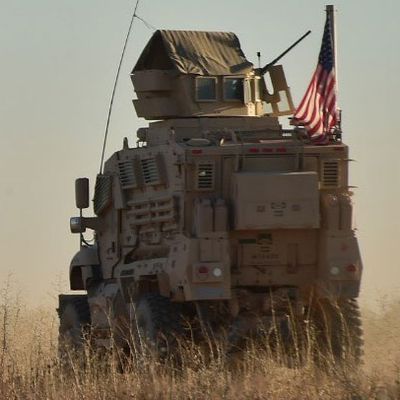
When the Pentagon announced on Wednesday that it planned to remove its remaining 2,000 troops from the Syria, it wasn’t clear, exactly, when it intended to do so. As the Washington Post’s Alex Horton pointed out on Twitter, different news outlets initially reported different versions of the story:
President Trump, meanwhile, declared mission accomplished on his Twitter account:
Reuters subsequently reported that, along with the troops, U.S. State Department personnel are also being evacuated from the country within 24 hours. The Pentagon eventually offered a half-explanation for the decision. “The Coalition has liberated the ISIS-held territory, but the campaign against ISIS is not over. We have started the process of returning U.S. troops home from Syria as we transition to the next phase of the campaign,” Pentagon spokeswoman Dana White told the Daily Beast’s Spencer Ackerman. It’s not clear, though, what that next phase will look like, or even if the Pentagon will still remove all American troops from the country.
This is a mess, but it does look like the Trump administration has begun to pivot away from its earlier strategy. Officials had repeatedly expressed a commitment to remain in Syria. “The new policy is we’re no longer pulling out by the end of the year,” James Jeffrey, secretary of State Mike Pompeo’s representative for Syria engagement, told the Post on September 6. Later the same month, John Bolton said that the U.S. planned to stay in Syria as long as Iran remained present there. “We’re not going to leave as long as Iranian troops are outside Iranian borders, and that includes Iranian proxies and militias,” Bolton told the U.N. General Assembly.
Bolton, of course, is fond of saber-rattling at Iran, which makes this pivot strange. While Trump has offered the rationale that ISIS has been defeated in Syria, Iran is still present there and ISIS is still active, albeit with less territory than it once held; meanwhile, the U.S. government itself concedes that at least 104 civilians are dead as a result of the four-year-long air-strike campaign against the terror group. (Human-rights workers told NPR in November that the real death toll is likely much higher.) Trump’s announcement is also interestingly timed.
At Foreign Policy, Lara Seligman reported Wednesday that on Tuesday, less than 24 hours before Trump declared mission accomplished in Syria, the U.S. State Department approved a “tentative $3.5 billion sale to Turkey of Raytheon’s Patriot surface-to-air missile system, in a potential breakthrough that could pave the way for smoother Turkey-NATO relations after a tumultuous few years.” The Raytheon sale doesn’t necessarily have anything to do with Trump’s announcement, and as Seligman notes, Turkey hasn’t explicitly accepted the deal. But Turkey had previously threatened to attack U.S.-backed Kurdish militants in north Syria, and the total departure of U.S. troops leaves the Kurds vulnerable to a Turkish assault. This wouldn’t even be the first time we’d made allies of the Kurds only to abandon them later.
The administration’s decision, and Trump’s tweet in particular, invokes an old spectacle — George W. Bush standing proudly on the deck of an aircraft carrier in 2003, a “Mission Accomplished” banner displayed behind him. At the time, the U.S. had not accomplished anything in Iraq except destabilization, a trend it failed to reverse in later years. The U.S. has put itself into a similar bind now. Though Trump didn’t make the initial decision to put boots on the ground in Syria, he continued that intervention and devised his own political justifications for it. Arguments against U.S. intervention in Syria appear ever wiser in hindsight; we appear to have learned nothing from our older, bloody mistakes in Iraq, least of all our own complicity in creating the enemy our troops in Syria have been deployed to fight. We are again in a place we shouldn’t be, and there are no good options left — not for the Kurds, and not for Syria.






























